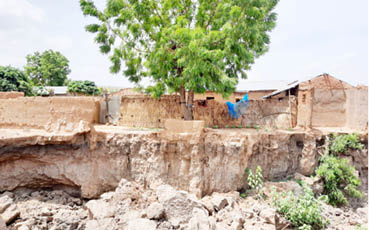Tales of sorrow as perenial erosion consumes 300 houses in Gombe
Unguwar Jauro Musa in Kumo town, headquarters of Akko LGA of Gombe State, has been battling gully erosion for the last 23 years, during which period over 300 hectares were destroyed and 300 households forced to relocate. In August, 2002, Daily Trust reported about the erosion, and three years later, our correspondent again visited the […]

Unguwar Jauro Musa in Kumo town, headquarters of Akko LGA of Gombe State, has been battling gully erosion for the last 23 years, during which period over 300 hectares were destroyed and 300 households forced to relocate.
In August, 2002, Daily Trust reported about the erosion, and three years later, our correspondent again visited the community but gathered that nothing has been done to ameliorate their suffering, with more people leaving their ancestral homes.
Residents told Daily Trust that the erosion worsened by 2020, when hundreds of them had to evacuate their belongings and relocate.
Muhammadu Babandudu (70), who lived with his wife and 10 children for over 40 years at Unguwar Jauro Musa, was in 2020 forced to relocate alongside his children after part of his house was destroyed following a downpour.
Babandudu said, “Apart from 19 of my immediate neighbours who have relocated, over 300 households have over the years abandoned their houses and escaped to safety.
“Every rainy season, residents raise funds to buy trucks of rocks to mitigate the impact of floods. But this has not stopped the erosion.
“We always sleep with our eyes open whenever it rains. The rainwater passes through our homes to reach the valley behind the houses.”
Muhammad Bello Saro (53), a civil servant with three wives and 23 children, said the erosion worsened after a 2013 road construction diverted floodwater from the Western part of the town to pass right through their houses.
He lamented that, “We are still living in the area because we have no option or other places to move to.
“When I moved into this area 25 years ago, the rift behind my house was too small to make a significant impact. But I have lost two rooms to the erosion and had to evacuate our belongings from the other room over fear of impending flood this rainy season.”
Malam Musa Kawuwa (53), a tailor and farmer, lived with his two wives and 10 children in a four-bedroom house he inherited from his father. But in 2014, following a downpour, the house was swallowed by the erosion. He also lost his 10-hectare farm.
After squatting in a two-bedroom building, he managed to rebuild his house four years later. But still, the erosion is threatening to swallow the house.
He said, “If nothing is done to address the situation, I may have to relocate again, because the wall of my house is on the verge of collapsing.”
Hundreds of other residents in Unguwar Jauro Musa of Kumo town are living with these fears.
The residents who claimed that the area was established over 153 years ago, said that flooding was also threatening the only public-owned primary school in the community, Jauro Musa Primary School, which was built by the community before it was taken over by the Akko Local Education Authority.
The pupils of the school have been split into morning and afternoon sessions after the erosion destroyed some of the classrooms, with the remaining structures on the verge of being swallowed up.
A retired teacher, Malam Yahuza Adamu Saleh, told Daily Trust that, “The erosion, which already claimed two classrooms, is also threatening to consume the remaining classes at any moment. Therefore, our children will have to drop out of school as it is the only public school nearby, and most of us are low-income earners and cannot afford the private schools.”
Unwilling to lose their homes without a fight, the residents formed a self-help group, Jauro Musa Concern Forum, to combat the erosion alongside other challenges in the community.
The Chairman of the forum, Abdulrasheed Ibrahim Musa, said while they were growing up, the gorge was over two kilometres away from the residential areas.
He further said, “But it has now reached us, and during each rainy season it destroys our houses, washes away farmlands and threatens classes in the only public primary school in the community.”
Musa explained that at the association’s level they had been contributing money to work to stop the erosion but that “it is a little effort which gives little hope that lasts for a few months, because the flood would wash it away again after a heavy downpour.”
He noted that three years after Daily Trust’s report, more than 10 households had evacuated their belongings and left their houses.
It was gathered that all the efforts by the community to bring the government’s attention both at the state and federal levels to the situation failed.
However, officials of the state Agroclimatic Resilience in Semi-Arid Landscapes (ACReSAL), said they were aware of the situation and that they had already earmarked the erosion site for control works.
The officials said the Jauro Musa erosion was part of five areas in the state marked for intervention during the previous Nigeria Erosion Control and Watershed Management Project (NEWMAP) “which was taken over as part of our interventions under the ACReSAL project.”
They explained that under ACReSAL, which is NEWMAP’s successor, work would soon commence for the Federal College of Education (Technical) gully erosion and subsequently the Jauro Musa’s and other marked erosion sites in the state.
